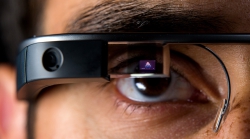A Sight to Behold
PROVO, Utah – Oct 04, 2018 – A recent entrepreneurial effort made by a group of BYU students may not be giving hearing to the deaf, but for those who face the challenges of limited or no hearing, the feat is a miracle nonetheless. Known as SignGlasses, this innovative business venture uses smart glasses to address some of the educational barriers faced by deaf and hard of hearing students.
The concept was born at BYU following a campus tour, during which a few deaf individuals were unable to experience the planetarium portion the way others could—a result of the impossibility of watching an interpreter while also looking at the display on the domed ceiling. In response to this challenge, BYU student Korey Hocker and a team of others set out to find a solution.
“We went around to classes, followed suggestions, and completed a validation period,” Hocker recalls.
Based on the information obtained, the proposed solution was to create one line of sight for the deaf or hard-of-hearing student by placing an interpreter in a pair of smart glasses. Here’s how it works: an off-site interpreter receives a live transmission of a lecture (by way of a clip-on microphone worn by the professor and a webcam on the student’s computer) and signs the interpretation to a camera. That interpretation then displays in a pair of smart glasses worn by the student, thus enabling the individual to focus on one place as opposed to two.
“We learned that there are a lot more applications for this technology than just a planetarium setting,” Hocker says. “It doesn't matter if it’s a planetarium, an auditorium, or a typical ten-person classroom—wherever there is an interpreter, the student has the challenge of looking two places at once.”
The groundbreaking idea combined with a passion to make a positive impact in the educational sphere led Hocker and his team members to get involved with the Social Venture Academy—one of twenty-nine programs available through the Ballard Center for Economic Self-Reliance. The purpose of the Academy is to help BYU students turn their revolutionary ideas into influential realities.
“When we heard about the Ballard Center, we realized we were a good fit,” Hocker says. “We have a social-good aspect that really drives us, and we were impressed with what the Ballard Center is doing. The mentoring, financial assistance, resources, and networking that we were able to gain has been very valuable, and it’s definitely something I recommend other people pursue.”
While the overall idea for SignGlasses might sound basic to some, the fact is that entrepreneurial efforts such as this are no simple task. Those who have been involved with identifying social issues and seeking feasible solutions know just how much hard work, creativity, collaboration, and time is required to find success. Even the best ideas must be well-developed and effectively presented if they are to find footing among so many other innovative concepts.
“Starting a new venture is hard because it involves exploring new territory,” says Aaron Miller, faculty advisor for the Social Venture Academy. “There is no clear path for any venture to follow, but there are skills that make success much more likely. We help students apply the best practices in entrepreneurship and social impact to help their work grow and thrive.”
For Hocker, the skills gained through his experience with the Academy have been quite beneficial, better preparing him to conduct and grow the SignGlasses venture moving forward. And while the venture has never been about himself, the feat that he and his team members have been able to accomplish truly is a sight to behold.
“Seeing the emotional response from users, schools, and family members of deaf individuals has been awesome,” Hocker says. “That response drives and motivates us—it’s one of the most rewarding aspects of being involved with SignGlasses. We hope we can make a measurable difference that not only benefits deaf individuals in their education but also equips them for the future.”
Media Contact: Chad Little (801) 422-1512
Writer: Brendan Gwynn




